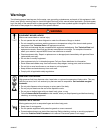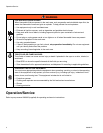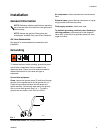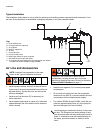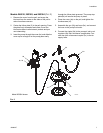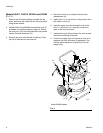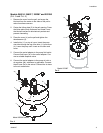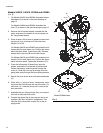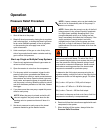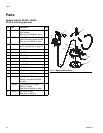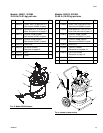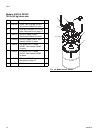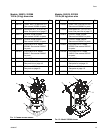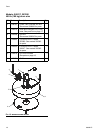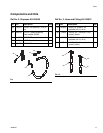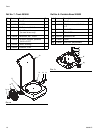
Operation
309967C 11
Operation
Pressure Relief Procedure
1. Shut off the air to the pump.
2. Bleed off the air pressure by closing the air regulator
(self–relieving type), or closing the bleed–type mas-
ter air valve installed upstream of the air regulator,
or disconnecting the air supply hose at the
quick–disconnect.
3. Hold a metal part of the gun or valve firmly to the
side of a grounded metal waster container and trig-
ger to relieve fluid pressure.
Start–up: Single or Multiple Pump Systems
1. Close the air regulators and bleed–type master air
valves to all but one pump.
2. Open the master air valve from the compressor.
3. For the pump which is connected, trigger the dis-
pensing valve into a grounded metal waste con-
tainer, making firm metal–to–metal contact between
the container and valve. Open the bleed–type mas-
ter air valve, and open the pump air regulator slowly
until the pump is running. When the pump is primed
and all air has been pushed out of the lines, release
the trigger.
4. If you have more than one pump, repeat this proce-
dure for each pump.
5. Set the air pressure to each pump at the lowest
pressure needed to get the desired results.
6. Read and follow the instructions supplied with each
component in the system.
7. When shutting off the system, always follow the
Pressure Relief Procedure.
NOTE: When the pump is primed, and with suffi-
cient air supplied, the pump starts when the dis-
pensing valve is opened and shuts off when it is
closed.
NOTE: A pump runaway valve can be installed on
the air line to automatically shut off the pump if it
starts to run too fast.
NOTE: Never allow the pump to run dry of the fluid
being pumped. A dry pump will quickly accelerate
to a high speed, possibly damaging itself. If the
pump accelerates quickly or is running too fast,
stop it immediately and check the fluid supply. If the
supply container is empty and air has been
pumped into the lines, prime the pump and lines
with fluid, or flush it and leave it filled with a com-
patible solvent. Be sure to eliminate all air from the
fluid system
The maximum working pressure of each pump in your
system may not be the same. To reduce the risk of
over–pressurizing any part of your system, be sure you
know the maximum working pressure rating of each
pump and its connected components. Never exceed
the maximum working pressure of the lowest rated
component connected to a particular pump.
To determine the fluid output pressure using the air
regulator reading, multiply the ratio of the pump by the
air pressure shown on the regulator gauge. For exam-
ple:
50:(1) ratio x 100 psi air = 5000 psi fluid output
50:(1) ratio x 0.7 MPa air = 35 MPa fluid output
50:(1) ratio x 7 bar air = 350 bar fluid output
Limit the air to the pump so that no air line or fluid line
component or accessory is overpressurized.



